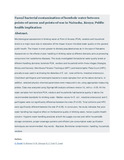Faecal bacterial contamination of borehole water between points-of-access and points-of-use in Naivasha, Kenya; Public health implication
Date
2015-03Author
Donde, O.
Wairimu, A.
Shivoga, A. W.
Trick, G. C.
Creed, F.
Metadata
Show full item recordAbstract
Microbiological assessment of drinking water at Point of Access (POA), vendors and household levels is a major issue due to realization of the impact of poor microbial water quality on the general public health. The impact is even greater in densely populated areas as in the case of Naivasha. Assessment on the effects of poor handling of drinking water at different domains aims at protecting consumers from waterborne diseases. The study investigated the bacterial water quality levels at different handling domains; borehole POA, vendors and household within three villages (Karagita, Mirera and Kamere). Membrane Filtration Technique (MFT) and heterotrophic Plate Count (HPC) procedure was used in estimating the densities of E. coli , total coliforms, intestinal enterococci, Clostridium perfringens and hetetrophic bacteria in water samples from all the above domains. In addition, selected physico-chemical parameters were measured in situ using appropriate measuring probes. Data was analyzed using Sigmaplot® analysis software version 12, with a = 0.05. All the water samples from borehole POA, vendors and households had bacterial quality of above the recommended standards for drinking water. Median values for E. coli , intestinal enterococci and C. perfringens were not significantly difference between the sites (P>0.05). Total coliforms and HPC were significantly different between the site (P<0.05). In conclusion, the study indicates that poor water handling has negative effect on the bacterial quality of drinking water, hence a public health concern. Hygienic water handling practices at both the supply sources and within households storage containers, proper sewerage systems and efficient pre-consumption water purification techniques are recommended. Key words : Bacterial, Boreholes contamination, handling, household, vendors
URI
https://www.semanticscholar.org/paper/Faecal-bacterial-contamination-of-borehole-water-in-Donde-Wairimu/4ad9b4c9530bd5bc6197ac7589d4e8fee4ad778bhttp://r-library.mmust.ac.ke/123456789/1762
Collections
- Gold Collection [1026]

